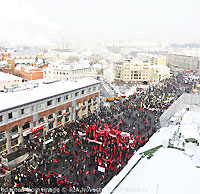Russian Political System ‘Steady’, Not ‘Broken’ By Protests – Deputy PM

(RIA Novosti – London, May 1, 2013) The political system in Russia is steady and capable of transformation, it is changing in parallel with changes in society, Russian Deputy Prime Minister Vladislav Surkov believes.
“The system is not broken, this is someone’s invention. The system of which I have to honour to be a co-author exists, and it survived the 2011 election. The same system was working then.
“Do you really feel that after the rally (of the opposition) in December 2011 the old system collapsed? No, it defeated the opposition. It’s a fact. The system should not be destroyed, it should not collapse, it should adapt to changing conditions. The system has to change,” Surkov said when speaking at the London School of Economics on Thursday (as received; should be Wednesday 1 May) and answering questions from the audience.
The deputy prime minister, who held senior posts in the administration of the Russian president between 1999 and 2011, explained that changes in the system did not mean its destruction or elimination but constituted a means for its transformation.
“Society changes, and the political system has to change. There is no contradiction here. This is in fact the main thing that the system showed in 2011: that it is capable of changing. It encountered certain challenges, realized that there was disaffection in society, that it was profound, and it adapted,” Surkov said.
“The system displayed long-awaited harshness towards extremists and those who deemed it possible to beat up policemen: they were heavily punished. The system showed that it can respond harshly,” the deputy prime minister said.
However, he said, the system showed that it could be flexible. Surkov gave the law on liberalizing the procedure for registering political parties as an example. “When the political space was successfully rendered healthy, the bill was drawn up. The system was responsive to tangible changes in society,” Surkov said.
